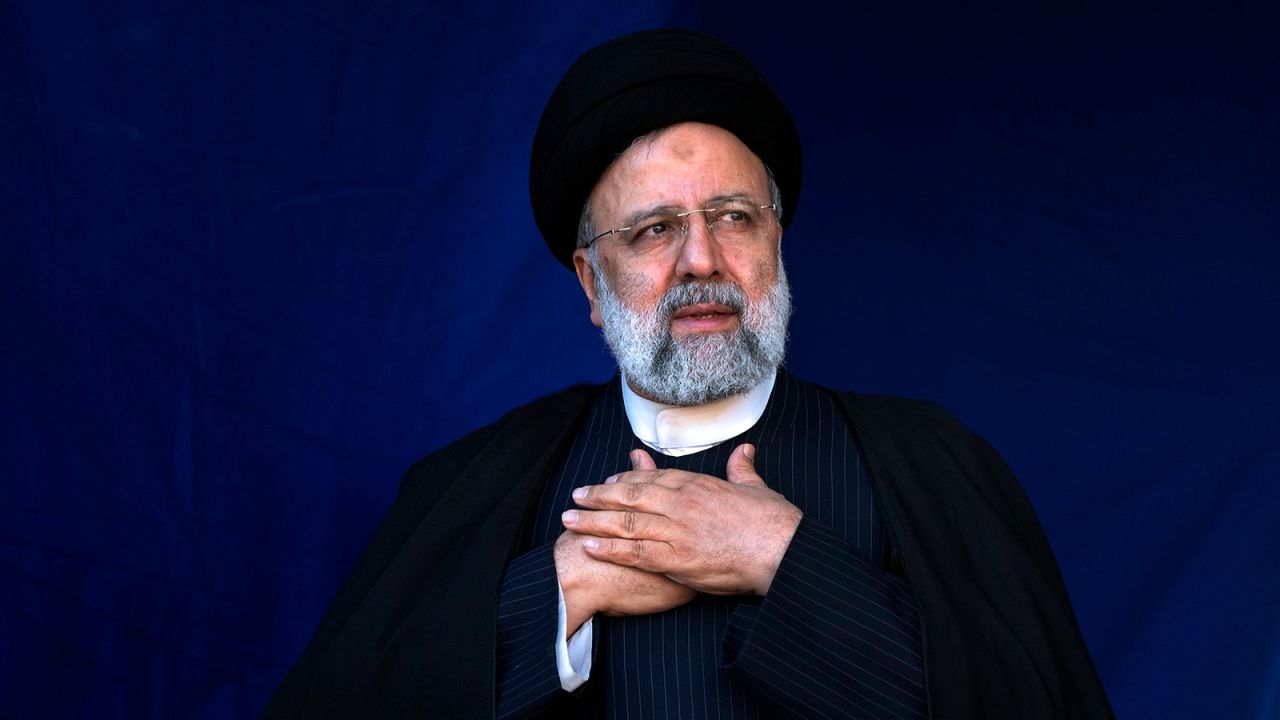Editor’s Note: Frida Ghitis, a former CNN producer and correspondent, is a world affairs columnist. She is a weekly opinion contributor to CNN, a contributing columnist to The Washington Post and senior columnist for World Politics Review. The views expressed in this commentary are her own. View more opinion on CNN.
The official tone from state-controlled Iranian media was grave and mournful on Sunday night as searchers struggled to reach the wreckage of the helicopter carrying President Ebrahim Raisi, 63, and other top officials after it crashed into the mountains in blinding fog.

Occasionally, however, celebratory fireworks streaked into the sky, a reminder that Raisi, and the regime that controls the Islamic Republic of Iran with increasing ruthlessness, is reviled by large segments of the population.
On social media, young Iranians rejoiced at what would soon be confirmed as the deaths of hardliners Raisi, Foreign Minister Hossein Amir Abdollahian and others, enforcers of a regime that has crushed their freedoms.
In the hours, weeks and months ahead, Iran’s power centers will no doubt engage in fierce infighting for key positions as the Islamic Republic selects a new president – the country’s second most powerful position – and constructs the alignments that will determine who becomes the next supreme leader, the man who will succeed Ali Khamenei, 85, gaining ultimate and absolute authority.
Raisi, a loyal Khamenei acolyte, was one of the favorites for that job. So his death not only vacates the No. 2 spot, it also sends the contest for the top job into turmoil.
It’s remarkable in this crucial battle over the future of Iran and who will lead it potentially for years if not decades to come, that millions of Iranians – perhaps even the majority of the people – will have no voice, no one to represent their views.
This moment of internal flux comes at a fraught time. The Middle East is watching anxiously as Israel and Hamas fight in Gaza. Hamas, one of Iran’s proxy militias, is receiving backing from other armed groups with close ties to Iran — Hezbollah in Lebanon and the Houthis in Yemen, all of which oppose the existence of Israel. Amid fears that the Gaza war will become a regional conflagration, Iran is a key player.
It was only a few weeks ago that Iran had its first direct confrontation with Israel, launching rockets and missiles after Israel struck its embassy complex in Damascus. The world held its breath as the two regional powers clashed. The flare-up died down without escalating.
Iran is also an important player in Russia’s war against Ukraine, providing the Kremlin with mass quantities of military drones it has used to attack Ukrainians, and becoming part of a nascent bloc of anti-Western nations along with Russia, China and North Korea.
The unfolding reshuffling of power in Tehran is also of great interest to Arab countries. Iran’s traditional rival, Saudi Arabia, will be watching closely.
But it is inside Iran where the quest for power will unfold, and where its impact will be most directly felt.
The internal machinations are unlikely to produce a significant change in its stance toward the West, or toward the country’s own people.
Expect clerics and security forces – the military and Iran’s Islamic Revolutionary Guard Corps (IRGC) – to compete to see who can gain the upper hand, with hardliners in both groups seeking to position themselves for dominance.
The chance of a kinder, gentler Iran emerging after new presidential elections are held in 50 days are essentially nil. Moderates, reformers, liberals and democracy supporters have gradually but steadily lost their influence within the regime.
The Islamic Republic’s claim to democratic legitimacy within its mixed system of clerical and elected rule evaporated after the rigged 2021 election that brought Raisi to power.
Years ago, Iranian elections, restricted as they were, held an element of truth. Occasionally, a reformer would be elected. No more. The supremely uncharismatic Raisi ran in 2017 and lost. In 2021, the regime disqualified all but seven out of the nearly 600 prospective candidates, leaving only Raisi in an uncompetitive field, making sure that Khamenei’s hand-picked choice would win.
Even so, Iranians sent an electoral message. He won, but most voters spoiled their ballots or stayed home, with the lowest turnout in the Islamic Republic’s history.
They knew who Raisi was. He had made a name for himself from the earliest days of the revolution, sending thousands of political prisoners to their deaths in mass executions as part of the four-member so-called “death commissions” in 1988 that gave prisoners the deadly option to clear minefields for the Army, according to Amnesty International. Those who refused were executed.
After the 2009 election, widely believed to have been won by a reformist candidate denied victory by the regime, Raisi was instrumental in the violent crackdown against protesters in the so-called Green Movement.
Later, he became head of the judiciary, overseeing a tightening of restrictions and a brutal repression of the 2019 pro-democracy, anti-regime protests.
The US sanctioned him for his role in the “regime’s domestic and foreign oppression.”
Get Our Free Weekly Newsletter
- Sign up for CNN Opinion’s newsletter
- Join us on Twitter and Facebook
Having won the backing of the supreme leader partly due to his loyalty and willingness to enforce control at all cost, he became president in 2021. The next year, when Mahsa Amini died after her arrest by religious police who found her head cover insufficiently modest, a new popular uprising exploded across the country.
Women rejected the mandatory hijab, crying out “Women, Life, Freedom.” Raisi oversaw the crackdown against peaceful protests in what human rights organizations called “a tsunami of torture” with tens of thousands of arrests and hundreds of arbitrary executions.
Now Raisi is dead and the odds are that he will be replaced by another hardliner.
For Iranians who celebrated his demise, left out of the planning for the future of their country, the only consolation is that no regime lasts forever. Their revolution remains postponed, not cancelled.




